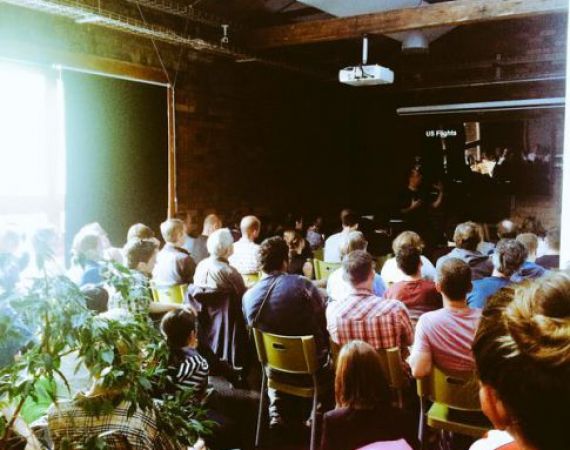Lunchtime talk write-up
Posted on Thu 2 Jul 2015
Making Data Meaningful
On Friday 26 June, Studio resident and founder of Data Unity Kev Kirkland joined us to explain how data can give us windows into hidden worlds that we don’t see in our day-to-day lives.

Photograph by @clarered
Speaker

Kev Kirkland
Kev is the founder of Data Unity. He is interested in data visualisation, Open Data and Open Source.On Friday 26 June, Studio resident and founder of Data Unity Kev Kirkland joined us to explain how data can give us windows into hidden worlds that we don’t see in our day-to-day lives. Here are five things I learned from Kev’s talk:
1. Context is the key to making data meaningful. If we don’t understand the environment within which the data was collected, or the impact that the data is having on its environment, then we don’t know how to digest and process the information being fed to us. We need to ensure we are presenting data in the real world.
2. There are many ways to visualise data, including representing quantities and relationships. Kev talked about Carbon Visuals as an example of a company taking one data figure and telling a compelling visual story around it.
3. It is also possible to represent data in a non-visual way; as sound or taste. My personal favourite example that Kev gave was multivariate beer that maps location data to ingredients. Eg. The population density was translated to amount of hops.
4. Kev often finds himself torn between wanting to create data in a visual way that has an impact on people’s understanding of their environment, and presenting scientifically rigorous data sets. Data Unity began with offering simple dashboard visualisation capabilities, and is now moving towards bringing data flows to forefront. By funnelling different data streams together, including static data and real time data, Data Unity is able to project visual data to browsers and phones, or use data streams to act on physical objects.
5. Kev is looking for people and cities to collaborate with in developing projects to digest the massive amounts of data continually being collected and to represent it in a tangible way. Data Unity has developed a 3D map of Bristol, which can operate as a canvas to paint local data on.